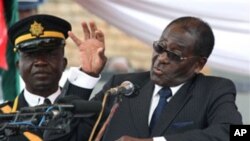The African Union summit in progress in Addis Ababa this week will not be taking up the subject of Zimbabwe, an AU official said Tuesday, a decision which has raised the ire of Zimbabwean civic groups that hopes the AU would focus its attention on the mounting crisis in Harare over the timeline to the next elections, among other issues.
AU Commission Secretary Jean Mfasoni said in an interview that Zimbabwe is not on the agenda because it is “now calm and these days there is no more fear that the situation will degenerate into a crisis." But many observers see tensions on the rise there.
AU sources said the situations in Ivory Coast, Somalia and Tunisia, where governments are in disarray or marginal at best, are dominating the summit agenda.
Zimbabwean civic groups at the summit led by the Crisis in Zimbabwe Coalition have been lobbying the African Union to take up the situation in Zimbabwe this week.
In particular, civic activists want the AU to consider whether the political environment in Zimbabwe is conducive for the holding of free and fair elections this year, push for the broad reforms most observers say are needed before elections are held, and ensure that the Southern African Development Community closely monitors any elections.
The Crisis in Zimbabwe Coalition issued a statement urging the AU to monitor political violence in Zimbabwe, which has been steadily rising for months.
The group said SADC and the AU must "ensure that Zimbabwe enforces constitutional civilian control over the army and the security forces to prevent interference with electoral processes and to ensure democratic transfer of power.''
The Crisis Coalition said that "the infrastructure of violence" including the youth militia closely associated with the ZANU-PF party of President Robert Mugabe, war veterans and a "partisan" security apparatus, " remains unreformed adversely affecting the most vulnerable groups" such as women, children, youth, the disabled and the elderly.
Crisis Coalition Director MacDonald Lewanika told VOA Studio 7 reporter Blessing Zulu that while Zimbabwe is not on the AU summit agenda, discussions of Ivory Coast, where the incumbent president, Laurent Gbagbo, has refused to step down following elections that Alassan Ouattara is internationally considered to have won, should yield some precedents applicable to Zimbabwe should a similar situation develop.
The current power-sharing government in Harare was formed following the presidential election of 2008 in which now-Prime Minister Morgan Tsvangirai defeated President Robert Mugabe in the first round but withdrew from a run-off election over deadly political violence targeting his supporters, leaving the outcome disputed.
Meanwhile, Human Rights Watch criticized South Africa for failing to press Zimbabwe's unity government to embrace key human rights reforms and halt rights violations.
In a report issued this week, the watchdog group said that although Pretoria should be commended for facilitating political dialogue in Harare - President Jacob Zuma has been a mediator in Harare on behalf of SADC since 2009 - it had failed the people of Zimbabwe by not speaking out against ongoing human rights violations.
Human Rights Watch cited the alleged beatings of villagers in the diamond-rich Marange district of eastern Manicaland province by soldiers, and the violence that disrupted the 2010 constitutional outreach process as instances in which Pretoria fell short.
Human Rights Watch Senior Researcher Tiseke Kasambala told VOA reporter Ntungamili Nkomo that South Africa should highlight rights issues in dealing with Harare.
"We feel that more could be done to push Mugabe and ZANU-PF to implement better and great human rights reforms," Kasambala said.
Commenting on the report, political analyst George Mkhwanazi agreed that Pretoria has sufficient leverage to influence the unity government on rights issues.
"South Africa has a duty to monitor democratic progress in countries that are in the region, and that includes Zimbabwe," he said. "So far that is not happening."
Elsewhere, the parliamentary committee responsible for revising Zimbabwe's constitution said it suspected that someone tried to steal data from a computer server housed at a local hotel, so it has decided to use the original handwritten source documents to prepare reports for thematic committees working in the next phase.




